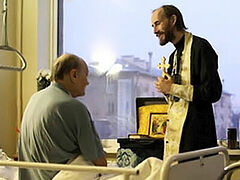How sometimes bizarre and strange are the intricacies of destiny that guide you through seemingly unbearable trials! But nevertheless, in all destinies the hand of the Lord is visible, and it sometimes literally returns our close ones from non-existence, helping us when it seems that no one and nothing can help.
One close acquaintance told me the story of her family—a story that amazed me by its love, selflessness, and mercy.
My grandmother, who was orphaned early, was brought up in the family of her uncle, a priest. They lived in the small Georgian town of Akhaltsikhe1 close to the Turkish border.
My grandmother was a very religious person. Although the Church of St. Marina, where Fr. Ephraim, her uncle, used to serve, had been closed under the Soviet regime, he continued to baptize all his relatives secretly (including my grandmother), performed funeral services, and married those who needed it. The 1930s were a tough time for the town, and there were shortages of food. My grandmother was married at that time. She had two daughters and a son. There was an orphanage in Akhaltsikhe, and orphaned children had a particularly hard time and were starving. The town authorities asked the locals who had the opportunity to take those children to their families. My grandmother, who was supported by her two brothers who sent her food from the village, decided to adopt two little sisters, relying on God’s help. The girls were Russian, since it was a railway junction and a military town. Unfortunately one of them, the eldest, was very weak and soon died. The youngest, Tamara, survived and lived in our family as a third daughter. Our family had a hard time, but were were closely-knit, and the children were always treated equally. On January 31, 1937, a great tragedy befell the family. My grandfather was taken away by the NKVD without explanation, and the family never saw him again. Much later we found out that shortly after the arrest my grandfather had been executed by a firing squad.
Tamara grew up, met a military man, fell in love with him, and they got married. When her husband was sent to serve in Ukraine (on the border), Tamara went with him. She and my grandmother corresponded, and Tamara wrote that everything was fine with them. Soon a son was born to their family, and a few years later the Great Patriotic War (1941–1945) broke out. Tamara’s husband, Alexei, joined the acting army at the very beginning of the war and went missing on the third day of the war—June 25, 1941. Tamara and her son managed to evacuate to Central Asia. On their arrival the child was placed into a kindergarten for evacuees. But there was a great tragedy: One day the children in this kindergarten were poisoned with water or food and all died. Tamara was stricken by grief. Her husband went missing, and her child was dead. She was all alone again.
The family of my grandmother, who was left alone with the children before the war (my grandfather died early), was not spared by the war either. Her eldest daughter, my aunt, died after contracting typhoid fever in a military hospital where she had worked as a paramedic.
At first there was no news from her seventeen-year-old son, my uncle, who had gone to the front, and then my grandmother received a letter from the hospital where he had been staying. The letter informed her that her son did not want to live after being wounded and undergoing the amputation of his right arm, and we were asked to come urgently. It was dangerous to travel at that time—trains did not run regularly, and there were many cases of robbery and violence. My grandmother, who could not travel for health reasons, told my mother: “Go, everything will be fine—I will pray for you.” My mother, who was finishing school at that time, went and arrived there with great difficulties. She told her brother, “You must live! I will be your right arm, just live!” She brought him home, and she and my grandmother literally did not leave his side, helping him in everything.
 Military hospital of the 1940s
Military hospital of the 1940s
In the early 1950s my grandmother’s family moved to Tbilisi, as her children needed to study. They entered universities; my mother studied to become a medic, and my uncle to be a lawyer. Life went on. And one day a letter came from Tamara. She had told someone that she had a family in Georgia who had raised her, and they helped her find us. Tamara wrote that she was all alone again, having lost her loved ones, and would like to return. My grandmother immediately replied that she should not delay and must definitely come. So Tamara, my mother’s adopted sister, found a family again.
Tamara travelled to us for a month, and when she arrived, she was so weak she couldn’t hold her head up and only kept shaking it from side to side. And for the second time my grandmother took care of her adopted daughter, who had again found herself on the threshold between life and death.
One day, when the family was having breakfast, someone knocked at their door. A postman brought them a letter and handed it to my grandmother. Just looking at the envelope, my grandmother fainted from excitement; she recognized Alexei’s handwriting and saw his name! Alexei wrote that on the third day of the war he was captured, then, after his release, his own people sent him to a labor camp where he worked at a construction site. Ex-prisoners of war were not allowed to write to their relatives from the camp. And now he was free, going home and looking for his wife and son. It was impossible to send Tamara alone to him, since she was still very weak. So Alexei came to take her. The story of his salvation, which he told us on his arrival, deserves to be committed to writing.
Alexei related that some time after being captured he was completely exhausted and could not get up in the camp from hard work and hunger. He was considered dead and thrown on a cart along with other dead inmates. They were to be taken and thrown into a large ditch, into which the fascists dumped dead prisoners. But then the German escort saw that a man was moving under the corpses. He pulled Alexei out, took him to his soldiers’ barracks and hid him under his bunkbed. He had to lie without moving, without making a sound or a groaning, otherwise this soldier would be shot for harboring a Soviet prisoner of war, not to mention Alexei. The soldier would share his ration with him, and when Alexei got a little better, he returned him to the labor camp, from which after a while they were released by Soviet troops.
It remains to be added that Alexei took Tamara to Ukraine, to the town of Fastov in the Kiev region. Over time she recovered. There they lived in a small house with a vegetable garden, and once we came to visit them.
This is how this story ended—full of tragedy, heavy losses, but at the same time full of selflessness, love and mercy.





